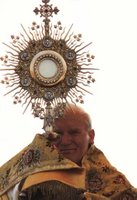
What is the Holy Eucharist? Do we understand its power and purpose? These questions lie at the heart of today's crises of faith since misunderstanding is a foundation for misuse. I recently sent a letter to the bishop of my diocese about these very questions. Regretfully, the same letter could have been sent to many other bishops in dioceses throughout America and abroad. Here is most of what I wrote:
"Thank you for serving, teaching, and guiding, in faith and ministry, the over one million Catholics of our diocese. I know that you take seriously the responsibilities of your office, and make every pastoral effort to ensure the well-being of the faith and of the faithful, entrusted by God, to your care. This is precisely why I am writing to you.
It seems that in recent years, our local Church has faced a number of liturgical challenges. As these challenges grow so too does our need to seek your guidance. For the Church, the liturgy forms the foundation for all charitable and spiritual works, for we are nothing without Christ, his word and his sacrament. Inconsistencies in the liturgy thus weaken the foundation of faith and sacramental grace that we depend on as Christians.
As you know, Redemptionis Sacramentum (RS), the 2004 document of the Congregation for Divine Worship and Discipline of the Sacraments, outlines liturgical norms that help us to worship “in spirit and truth” the sacred reality of Christ’s Real presence, “the source and summit” of all graces. As essential as this is, I find that many parishes, individual priests and lay faithful in the diocese fail to implement even the broad strokes of RS, and thus undermine faith in the greatest gift God has ever given to the Church. In so doing, the faithful can no longer recognize Jesus “in the breaking of the Bread.” If, as our late Holy Father John Paul II wrote in paragraph 12 of Ecclesia de Eucharistia, “The Church constantly draws her life from the redeeming sacrifice”, then to shortchange the liturgy is to shortchange life itself.
I am confident that many of what RS terms “liturgical abuses” happen beyond your pastoral gaze, in the shadows and sanctuaries of individual parishes, at specific liturgies and hours of adoration, while you look after broader episcopal concerns in the over 50 churches in your charge. In these instances, we as your flock must abide by our “most serious duty” to protect the Eucharist from “any and every irreverence and distortion…” (RS 184) by alerting you to what you might not witness personally. I know that you will undoubtedly take seriously and address rigorously the concerns we bring to you...
I do not intend this letter to be an exercise in criticism of any person or group; instead, I offer it as my prayer for the renewal of the Church, local and universal. As we continue to appreciate the fruits of the Second Vatican Council, it is clear that the Church does not protect norms per se, but the deeper realities to which those norms refer. In other words, we need “right worship” but only because we strive to serve a righteous God.
The Church teaches that we can worship fully and beautifully only when our external gestures, practices and prayers relate to what we believe. “Lex orandi et Lex credendi.” For many, this connection is vital because knowing little about the faith, and receiving little in the way of catechesis, the laity are often led away from “the Truth” through liturgical practices that fail to fully teach it.
Thank you for reading this letter. If you have taken pastoral, catechetical and disciplinary actions already, I ask that you continue your efforts. If you have not, then I humbly ask that you do whatever you can, as soon as you can, to protect “the gift par excellence”, that of Jesus Christ himself (Ecclesia de Eucharistia 11)..."
As one wise priest commented, praying is the best avenue through which any of us can change anything. So let's get to it.



